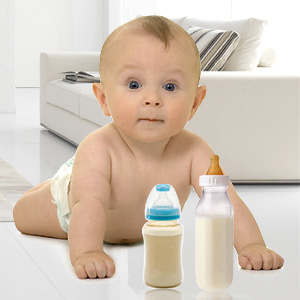Milk Allergy in Infants

Statistics reveal that not less than 100,000 babies suffer from milk allergy every year in the US. Infants with milk allergy are extremely fussy due to an allergy in cow's milk which is the basis for most commercial formulas. There are instances when even infants who are exclusively breast fed can exhibit signs and symptoms of food allergy.
The toddler exhibits a bloated stomach and suffers from chronic or constant gas, spits up frequently and cries incessantly. Some infants vomit after eating. Stools may be less frequent leading to constipation. For some, it may be extremely watery and loose and of the wrong color for a breast-fed baby.
Symptoms of milk allergy in infants
The eight classic signs of potential milk allergy in infants would include:
- Diarrhea is common in babies but if there is blood in the stools it could signal a serious allergy to milk.
- As indicated earlier, vomiting beyond typical mealtime regurgitation should be examined by a doctor.
- There occurs a possible skin rash due to milk allergy.
- Babies become extremely fussy and cry continuously and inconsolably for long duration of time. Gastrointestinal pain resulting from allergy to proteins found in milk may be the reason for the fussiness and crying.
- Low or no weight gain may be due to milk allergy due to excessive diarrhea and vomiting.
- Although all babies have gas, this can be another signal to allergy of milk proteins.
- Wheezing, struggling to breathe and excess mucus in the nose and throat may be due to baby's reaction to protein found in milk.
- Dehydration, loss of appetite and lack of energy may be due to milk allergy. The infant lacks proper nutrition and there is a failure to thrive.
Under such circumstances, it would be better to talk to the medical doctor about testing and alternatives of milk based formulas and dairy products.
Why does milk allergy occur?
Many protein allergens in milk can cause allergic reactions; Casein and whey are the two main components in milk. While curd that forms when milk is left to sour is called casein, the watery part which is left when the curd is removed is called whey. Casein accounts for at least 80% of protein in milk and the other allergen found is cheese. Whey accounts for the other 20% of milk. This consists of two main allergenic proteins - alpha lactalbumin and beta lactaglobulin.
When the immune system of the infant mistakes milk protein for something that the body should fight off, a milk allergy occurs. The allergic reaction that results can cause an infant to be fussy and irritable. It can upset the stomach.
However, infants who are breast feed have a much lower risk of developing a milk allergy than those who use formula feed. Typically, such milk allergies go away in the natural process when the child is between 3 and 5 years of age. There are instances when some kids never outgrow it. The toddler can be reintroduced to cow's milk on the advice of the allergist. In cases where the infant has outgrown the milk allergy, it can be introduced under close medical supervision.
Foods for sufferers of milk allergy
Toddlers suffering milk allergy must also avoid cheese, yogurt, ice-cream and cereals that contain powdered cow's milk. Butter and buttermilk is also not recommended for kids suffering milk allergy.
Replacements that can be considered are almond milk, oat milk, soy milk and rice milk. To ensure that the child is not suffering any nutritional deficiency, you can supplement with fruit juices and tofu.
Milk allergy and lactose intolerance
Many construe that a milk allergy is the same of lactose intolerance but it is not so. The inability to digest the sugar lactose, which is quite rare in infants and more common among older kids and adults, is termed lactose intolerance. Whereas, allergy to milk indicates a reaction to the protein in milk. This is common in infants and children.
Importance of breastfeeding
Breastfeeding is vital for an infant with allergies. In fact, breastfeeding is the best chance to outgrow the allergies and prevent others in toddlers and infants. The concept here is that the more strictly the offending allergen is avoided, the more likely the child will outgrow the allergy.
Supplements for milk allergy
If the baby is allergic to milk but not soy, the parent can use the soy formula. The label has to be read carefully for any whey or casein or other milk names. And it should be well remembered that about 30 - 50% of babies with milk allergy also develop soy allergy.
Most of the times, infant milk allergy is treated either by eliminating the milk proteins from the nursing mother's diet or by replacing with an amino acid based formula instead of the regular formula.
Top of the Page: Milk Allergy in Infants
Tags:#milk allergy in infants #signs of milk allergy in infants #milk allergy and lactose intolerance
 Parenting
Parenting Stages of Growth
Precocious Puberty
Nutrition for Kids
Developmental Milestone
Empty Nest Syndrome
Infants
Sudden Infant Death Syndrome
Infant Gas Drops
Milk Allergy in Infants
Infant Reflux
Infant Nutrition
Infant Bathing
Infant Toy
Infant Colic
RSV in Infants
Asthma in Infants
Infant Brain Development
Babies
Baby Milestone
Baby Teething
Toddler Food Recipe
Baby Nursery Furniture
Baby Food Tip
Baby Monitor
Baby Burping
Children Care
 Regular Bedtime for Toddlers
Regular Bedtime for Toddlers Child Care
Kid Summer Camp
Kid Gym
Tween Parenting
Benefits of Breastfeeding
Oppositional Defiance Disorder
Attention Deficit Hyperactivity Disorder - ADHD
Kid Homework Help
Fine Motor Skill
Family Parenting
Single Parenting
Specialty Toy
Child Playhouse
Playgroup
Causes of Child Obesity
Autistic Child
Learning Disability
Toddler Activity
Activities for Toddlers
Child Safety Tip
Child Safety on the Net
Allergies in Toddlers
Top of the Page: Milk Allergy in Infants
Popularity Index: 101,008

